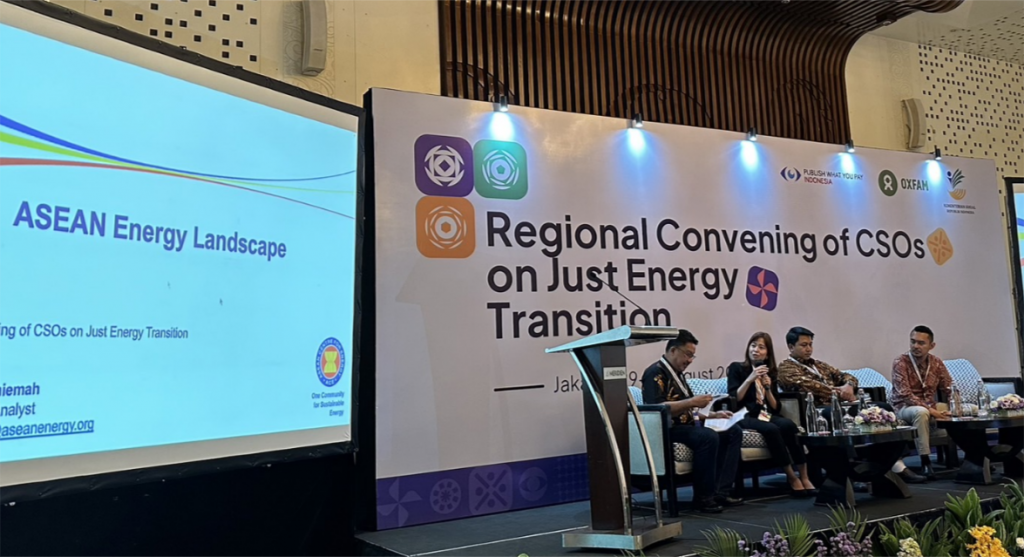Jakarta, 29 August 2023

Figure: Aldilla Noor Rakhiemah, ACCEPT’s Senior Research Analyst at the Regional Convening of CSOs on Just Energy Transition
ASEAN Centre for Energy (ACE) through the ASEAN Climate Change and Energy Project (ACCEPT) has participated at the Regional Convening of CSOs on Just Energy Transition held on 29 August 2023 at Le Meridien Hotel, Jakarta. ACCEPT’s Senior Research Analyst, Ms. Aldilla Noor Rakhiemah contributed to the event as one of the speakers at the first session that discussed the ASEAN Energy Landscape. The objective of this session is to discuss and provide context on the current and projected energy landscape in the ASEAN region.
Ms. Aldilla opened the session by giving data on ASEAN Energy Landscape. She shared the ASEAN socio-economic and energy status which has a positive trend. Talking about the ASEAN energy demand, she explained that ACE has a forecast for energy demand in the ASEAN region that is published every two weeks. According to ACE, the ASEAN annual GHG emissions will reach 6.7 GT. Reflecting from that enormous number of emissions, ASEAN Plan of Action for Energy Cooperation (APAEC) is an important ASEAN’s blueprint which reflects commitments from each ASEAN Member States (AMS), for energy transitions and energy resilience to a better inclusion. Climate change itself is lying under the APAEC number 6. Ms. Aldilla added that renewable energy share in energy supply, renewable energy share in power capacity, and energy intensity reduction are the current targets of the ASEAN region.
Speaking about the Just Energy Transition (JET), Ms. Aldilla pointed out that the Joint Declaration on Energy Security and Energy Transition in ASEAN included a reference to JET. It is also noted that JET requires cooperation to ensure sustainable impact in the 41st official energy meeting. On the most recent ASEAN energy meeting, for instance, Indonesia, Malaysia, and Singapore inked the interconnectivity grid. However, further investment is also required.
From the governmental side, Mr. Muhammad, a representative of Indonesia’s Ministry of Energy and Mineral Resources’ (DJEBTKE) Directorate General of New Renewable Energy and Energy Conservation, gave a presentation on the region’s energy transition. Power generation has nearly tripled over the last two decades, according to Indonesian DJEBTKE, with a total renewable energy share of the ASEAN installed capacity growing from 19.1% in 2005 to 33.3% in 2020. He continued by pointing out that the ASEAN region’s electricity production varies, with PV seeing the largest growth—from 1 MW in 2005 to 23.058 MW in 15 years.
Indonesia itself has 3.7 TW RE potential, where utilization of renewable energy in 2022 increased by 18% from consumption in 2021. With international support, Indonesia has more ambitious towards net zero emissions including electrification, CFPP early retirement, CCS/CCUS, NRE Development, new energy sources, and energy efficiency. Lack of RE infrastructures, policies, and limited access to energy are current challenges faced by Indonesia. However, the development of RE technologies, strengthened policies that support energy transition, and collaboration between ASEAN countries can overcome the situation.
Adding a perspective from a Think Tank, Mr. Deon Arinaldo, Energy Transformation Program Manager at Institute for Essential Services Reform (IESR) shared the energy transition landscape and the opportunity of ASEAN countries. The latest IPCC report shows that global temperature increase has reached 1.1C, where SEA countries also contributed to this climate crisis. According to IESR, climate risk of Indonesia is the highest in the ASEAN region. With a total of 2.7 GT total emissions of CO2 produced by ASEAN member states, Mr. Deon suggested that if we want to commit to a more ambitious climate target, we need to work on it together. Additionally, ASEAN can be a powerhouse of renewable energy technology, especially in solar with a total capacity of up to 2400 GW, but AMS should work together to make the region becomes the production hub of this renewable energy.
In conclusion, as seen by the ASEAN Energy Cooperation Plan (APAEC) 2021–2025, which defines several regional targets including a 25% reduction in greenhouse gas emissions by 2035, ASEAN countries have made a significant commitment to a clean energy transition. Civil society and groups actively push for economic and environmental justice in Southeast Asia. There must be no one left behind during the just energy transition. The disproportionate harm caused by climate change to vulnerable groups must be addressed in the transition to renewable energy sources. People in poverty, indigenous peoples, and women are frequently those most at risk from the effects of climate change. As a result, national and regional policies are crucial to this transition.
Detailed information on ACCEPT II can be found at https://accept.aseanenergy.org/
ACCEPT welcomes any collaboration, please feel free to contact us at [email protected]